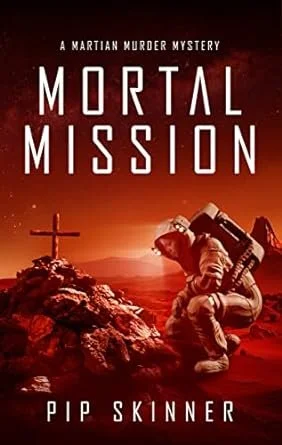SPSFC 3 Author Interview- Pip Skinner
1. What inspired the world, characters, or core concepts of your story? Was it a particular event, piece of media, or a speculative scientific idea?
I was watching the Perseverance Rover land on Mars, and they were talking about the various methods being explored for returning the samples drilled by the rover to earth. I found myself wondering if there were people who didn’t want to know if there was life (at any time) on Mars. Would they kill to prevent the samples getting back to earth? Then I realised I had a cracking book idea which pursued me in my dreams and prevented me finishing my WIP. Finally, I gave up and wrote it.
2. How did you approach the creation of your main characters? Were they modelled after real-life figures, or did they evolve organically as you explored the world of your story?
I decided early on to have an international crew on my mission. The MC, Hattie Fredericks, sat on my desk and wouldn’t go away. The rest developed as the story progressed. I don’t outline, I just write so the characters only become fully formed from their actions.
3. Science fiction often delves into questions of ethics, technology, and humanity. What central theme or moral question does your story grapple with, and why did you feel it was essential to explore?
It grapples with the consequences of finding life on another planet, and what lengths some people will go to prevent our knowledge expanding if it clashes with their beliefs.
4. How did you approach the integration of futuristic technology or scientific concepts in your story? Did you base them on existing theories or let your imagination run wild?
I did 6 months of research on the latest technology and real science of getting to and living on Mars. I had to accept that even as I wrote my book, some things were becoming obsolete. But its as realistic as I could make it under those constraints.
5. The sci-fi genre provides a canvas to depict diverse cultures, species, and worlds. How have you incorporated representation and diversity in your work, and why do you think it's vital for the future of science fiction?
Science fiction is a blank canvas as far as diversity is concerned. Anything goes. I have always admired the original Star Trek for this reason and in fact, dedicated Mortal Mission to Nichelle Nichols (among others). I do not have aliens as my book is set in the very near future based on human space exploration. I have an international crew, one of whom is gay. Their nationalities and genders are not the point of the story. It’s about the boundaries of science and belief, not colour or gender. The nationality does have a slight bearing on what happens due to governmental interference, but the race is irrelevant. I hope science fiction will always push barriers, but for me, real science trumps aliens and ludicrous speed.
6. Every author has a unique writing process. Can you share a bit about yours? How do you manage world-building, plot progression, and character dynamics in such a complex genre?
I did the research first and wrote second. I am a pantser, and I had fun with the murder mystery and making its characters relatable and real. I had no idea what would happen or who the murderer was when I started writing. I even killed my murderer by mistake early on, and ¾ of the way through the book had to revive them and rewrite bits. (Hahahaahahaha). I write one draft and make minor adjustments if my beta readers spot anything, but I don’t mess around with lots of drafts. I don’t have the patience.
7. What's next for you after SPSFC? Are there any upcoming projects you can share with us?
I’m writing a cosy mystery series now, The Seacastle Mysteries, and am planning a sequel to Mortal Mission when the story comes to me. I also have a second adventure series and some standalones in my brain waiting for their turn in the queue.


